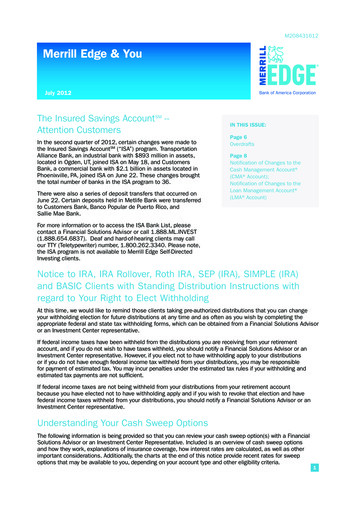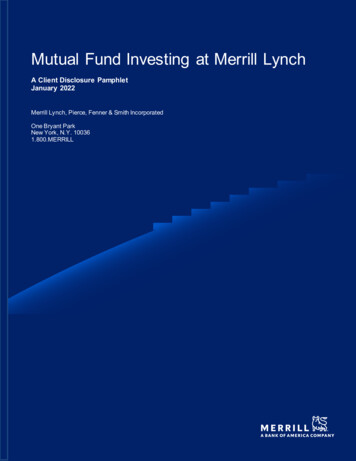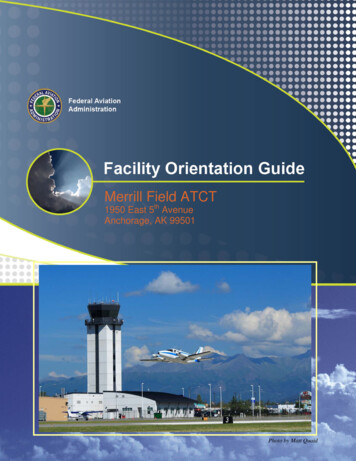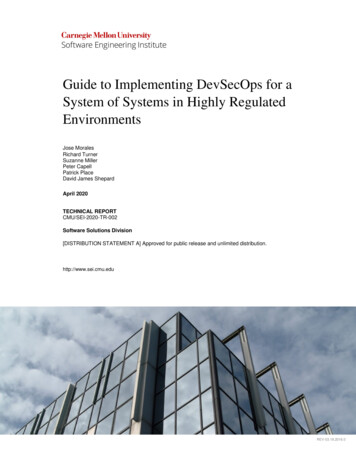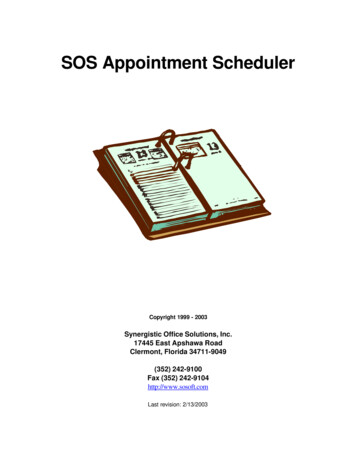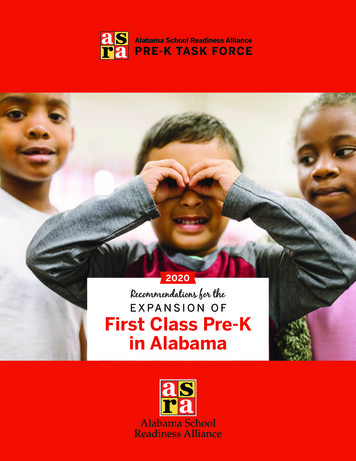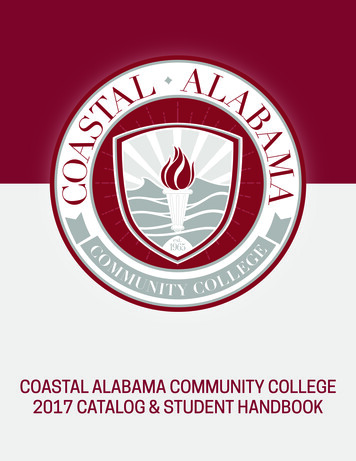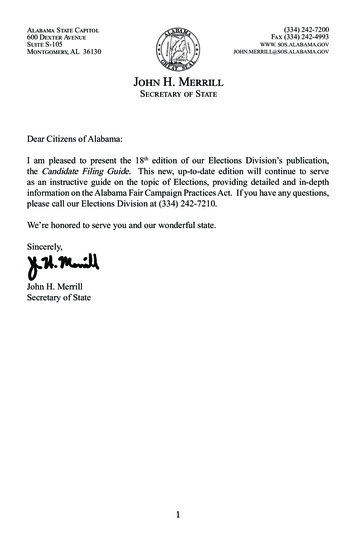
Transcription
(334) 242-7200Fax (334) 242-4993Alabama State Capitol600 Dexter AvenueSuite S-105Montgomery, AL 36130WWW. SOS.ALABAMA.GOVJOHN.MERRILL@SOS.ALABAMA.GOVJohn H. MerrillSecretary of StateDear Citizens of Alabama:I am pleased to present the 18th edition of our Elections Division’s publication,the Candidate Filing Guide. This new, up-to-date edition will continue to serveas an instructive guide on the topic of Elections, providing detailed and in-depthinformation on the Alabama Fair Campaign Practices Act. If you have any questions,please call our Elections Division at (334) 242-7210.We’re honored to serve you and our wonderful state.Sincerely,John H. MerrillSecretary of State1
ContentsNotes, Acknowledgements, and Disclaimers . . . . . . . . . . . . . . . . . . . . 3Getting Started . . . . . . . . . . . . . . . . . . . . . . . . . . . . . . . . . . . . . . . . . . . 4Campaign Funds . . . . . . . . . . . . . . . . . . . . . . . . . . . . . . . . . . . . . . . . 20Campaign Advertising . . . . . . . . . . . . . . . . . . . . . . . . . . . . . . . . . . . . 24Frequently Asked Questions . . . . . . . . . . . . . . . . . . . . . . . . . . . . . . . 31Elected Officials . . . . . . . . . . . . . . . . . . . . . . . . . . . . . . . . . . . . . . . . . 41Appendix A: Independent Candidacy . . . . . . . . . . . . . . . . . . . . . . . 43Appendix B: Changes in Law . . . . . . . . . . . . . . . . . . . . . . . . . . . . . . 46Appendix C: Online Filing System Quick Overview. . . . . . . . . .54For General Questions and Obtaining FormsContact the Office of the Secretary of StateMailing Address:Elections DivisionOffice of the Secretary of StateP.O. Box 5616Montgomery, Alabama 36103-5616Telephone:General FAX:FAX for Reporting:Website:E-mail:(334) 242-7210 or (800) 274-8683(334) 242-2444(334) or Online Filing QuestionsWebsite:Help Desk:fcpa.alabamavotes.gov(888) 864-8910For Ethics Act Compliance QuestionsContact the Alabama Ethics CommissionTelephone:Wwebsite:(334) 242-2997ethics.alabama.gov2
SPECIAL NOTE FOR FEDERAL CANDIDATESThis filing guide applies to candidates for state, county, and municipaloffices. Federal candidates must follow reporting guidelines anddeadlines administered by the Federal Elections Commission (FEC).For more information, please contact the FEC at:Federal Elections Commission999 E Street NorthwestWashington, D.C. 204631 (800) 424-9530www.fec.govPUBLICATION NOTESFCPA CANDIDATE FILING GUIDE—EIGHTEENTH EDITIONPrepared by the Office of the Secretary of StateEditorsJohn H. Merrill, Secretary of StateDavid Brewer, Deputy Secretary of State, Chief of StaffHugh Evans, General CounselClay Helms, Deputy Chief of Staff, Director of ElectionsEd Packard, Administrator of ElectionsJeff Elrod, Supervisor of Voter RegistrationLaural Bunn, Elections AnalystCandace Payne, Elections AnalystJaney Whitney, State Professional TraineeVicki Wittenborg, State Professional TraineeCameron Mixon, State Professional TraineeAcknowledgementsThe Office of the Secretary of State appreciates the guidance providedby the Office of the Attorney General through its Opinions Division.The Secretary of State would like to extend a special thanks toformer Assistant Attorney General Brenda Smith for the time shedevoted to reviewing previous editions. The Secretary of Stateappreciates Gregory P. Butrus, partner of Balch & Bingham LLP, forhis contributions to and review of previous editions of this guide.Appreciation is also extended to the Administrative Office of Courtsand the Alabama Ethics Commission.Legal DisclaimerThis document is not a substitute for the Code of Alabama 1975. It isprovided as a guide and is not intended to be an authoritative statement of law. For further legal information, please consult the Codeof Alabama 1975, other appropriate legal resources, or your attorney.3
CHAPTER ONEGETTING STARTEDThe Fair Campaign Practices Act (FCPA), the state’s campaignfinance law, is found in the Code Of Alabama 1975, § 17-5-1 through§ 17-5-21. This act sets the rules for how and when candidates canraise and spend money. The law also specifies how campaign financeactivities are reported.MANDATORY CAMPAIGN FINANCE COMMITTEEThe law requires every candidate to organize a campaign financecommittee and file an APPOINTMENT OF PRINCIPAL CAMPAIGNCOMMITTEE form, which lists who serves on the committee. (§ 175-4)The committee form must be filed within five (5) days ofbecoming a candidate. For purposes of the FCPA, the law definestwo (2) ways to become a candidate, the first of either [See § 17-52(a)(1)]:1. reaching the disclosure threshold by either receivingcontributions in excess of 1,000 or making expendituresin excess of 1,000, regardless of the office sought; or2. qualifying as a candidate with a political party or filing apetition as an independent candidate.Effective August 1, 2023, all principal campaigncommittees for municipal candidates that previously filedwith the judge of probate shall file electronically with theSecretary of State. (Act 2021-314)A candidate may either serve as the sole member of their principalcampaign committee or may appoint from two (2) to five (5) persons.If a candidate serves as their own principal campaign committee,they shall designate a COMMITTEE DISSOLUTION DESIGNEE, aperson responsible for dissolving the principal campaign committeein the event of the candidate’s death or incapacity. If the designated4
person is unable to serve in this capacity at the time of the candidate’sdeath or incapacity, the principal campaign committee shall bedissolved by the candidate’s personal representative as appointed bythe judge of probate. [§ 17-5-4(c)]Candidates and PACs may also select a DESIGNATED FILINGAGENT when appointing their campaign finance committee. Thatagent will be authorized to file all required reports for the candidateduring the election cycle.Political Action Committees need to fill out a STATEMENT OFORGANIZATION OF POLITICAL ACTION COMMITTEE form onlinewith the Secretary of State in order to register the PAC. Once a PACraises or spends more than 1,000 to influence an election cycle, thefiling of regular reports is required.STATEMENT OF ECONOMIC INTERESTSExcept for federal candidates and office holders with a currentSTATEMENT OF ECONOMIC INTERESTS on file, candidates atevery level of government must file a STATEMENT OF ECONOMICINTERESTS form with the State Ethics Commission no more thanfive (5) days after the date they file their qualifying papers withthe appropriate election official. (§ 36-25-15) This form covers theprevious calendar year. A candidate who has a current STATEMENTOF ECONOMIC INTERESTS form on file with the Ethics Commissiondoes not have to file a duplicate form. For questions about filing theSTATEMENT OF ECONOMIC INTERESTS form, please visit ethics.alabama.gov or contact them at (334) 242-2997.If the individual becomes a candidate by qualifying with apolitical party, the STATEMENT OF ECONOMIC INTERESTS mustbe submitted to the State Ethics Commission no more than five (5)days after the date such candidate files their qualifying papers withthe appropriate political party. (Ethics Commission Advisory Opinion2016-17)If the individual is seeking ballot access by submitting apetition for independent candidacy, the STATEMENT OF ECONOMICINTERESTS must be submitted to the State Ethics Commissionno more than five (5) days after the date such candidate files theirpetition to the appropriate election official, the Secretary of State forstate candidates and the judge of probate for county candidates. [§36-25-15(a); Ethics Commission Advisory Opinion 2016-17]5
Each election official who receives a declaration of candidacy orpetition to appear on the ballot shall, within five (5) days of receipt,notify the State Ethics Commission of the name of the candidateand the date on which the person became a candidate. The StateEthics Commission shall, within five (5) business days of receipt ofsuch notification, notify the election official whether the candidatehas complied with the requirement to submit a STATEMENT OFECONOMIC INTERESTS.INTERESTS. [§ 36-25-15(b)]A filing that is properly addressed, postage prepaid, postmarked,and mailed on the date the candidate qualifies complies with thestatute. A candidate may file a STATEMENT OF ECONOMICINTERESTS form online. (Ethics Commission Advisory Opinion2016-02)If a candidate does not submit a STATEMENT OF ECONOMICINTERESTS in accordance with the requirements of § 36-25-15, theirname shall not appear on the ballot, and they shall be deemed notqualified as a candidate in that election. The appropriate electionofficial shall remove the name of that candidate from the ballot.(AG’s Opinion 98-00200)AFTER THE MANDATORY COMMITTEE FILINGWhile every candidate must appoint a principal campaigncommittee, candidates who have not reached the 1,000 thresholdare exempt from filing the monthly, weekly and daily FCPA reportsuntil the threshold is reached. (AG’s Opinion 90-00343) Otherwise,these reports are due prior to an election. (§ 17-5-8)After reaching the threshold, a candidate or PAC files each FCPAreport at the required times. All contributions and expenditures,including those received or spent to reach the threshold, are reported.It is important to note that the payment of any qualifying feeor other cost associated with qualifying to run for office isconsidered an expenditure of the campaign; therefore, it shouldbe reported as such. If a candidate spends their own money ontheir campaign, each transaction must be reported as an in-kindcontribution. [§ 17-5-2(a)(7)]Contributions from a single source and expenditures made to a6
single recipient that are greater than 100 must be itemized on thesereports. Therefore, it is important for a candidate to maintain sometype of internal record for contributions of 100 or less, since anadditional donation from the same contributor could bring the totalto more than 100 and result in a need to itemize that contributor’scontributions. The same is true for expenditures of 100 or less.All candidates for all legislative, state school board, andstatewide offices who receive more than 5,000 in contributionsduring an election cycle must file their FCPA reports online. [§ 175-8(g)] The online FCPA reporting system contains everything acandidate needs to record contributions and expenditures and to filethe required reports. Act 2021-314, which becomes effective August1, 2023, requires all candidates for any office, including municipal,to file electronically.A municipal candidate may request forms for filing these reportsfrom either the Office of the Secretary of State or from the local probatejudge. These forms are also available on alabamavotes.gov. However,a candidate is not required to use the forms developed by the Officeof the Secretary of State, as long as the information required by theFCPA is included in the report. (AG’s Opinion 90-00211)Electronic filing is required for all state and county candidatesand all PACs. Beginning in August 2023, municipal candidates mustfile electronically with the Office of the Secretary of State and will nolonger file with the judge of probate.Candidates and PACs who spend more than 1,000 on an“electioneering communication” will have met the filing threshold forcampaign finance reporting. In accordance with Code of Alabama1975, § 17-5-8, the candidate or PAC must disclose their contributionsand expenditures relating to the electioneering communication.However, the candidate or PAC is not required to duplicate anyreporting. See CHAPTER THREE, CAMPAIGN ADVERTISING, forfurther information on electioneering communication.7
FILING LOCATIONS1. Reports for County, District, Circuit, Legislative, andStatewide OfficesThese candidates must submit their campaign finance reportsand forms online at fcpa.alabamavotes.gov.All Political Action Committees must also file their reportselectronically.Please note that paper filings will no longer be accepted as of August1, 2023.2. Reports for Municipal OfficesMunicipal reports are submitted to the office of the probatejudge in the county where that municipality’s city hall islocated. Beginning August 1, 2023, municipal candidates arerequired to file electronically.DEADLINESAccording to the FCPA, forms must be received on or beforethe due date. The FCPA electronic system will send automaticallygenerated reminders ahead of each deadline. Complete FCPA filingcalendars for each regularly scheduled election cycle are also availableon the Secretary of State’s website.8
FILING SCHEDULEDuring the election cycle, but no earlier than twelve (12) monthsprior to an election, campaign finance disclosure reports are filed atspecific times before the election.The FCPA filing calendar for the current election year is availablefrom the Secretary of State’s Office and is published on its website.Please take careful note of all deadlines as they may be subject tochange.The online FCPA reporting system contains a filing calendarfor each election cycle. Each candidate and PAC should select theirelection cycle and the system will automatically generate the correctcalendar for the candidate or PAC to follow.Additionally, principal campaign committees and PACs mustdisclose the receipt of any single contribution of 20,000 or morewithin two (2) business days of receiving the contribution if thecontribution is not reported in a monthly, weekly, or daily report.[§ 17-5-8.1(c)]PRE-ELECTION REPORTS1. Monthly ReportMonthly reports are due no later than the second businessday of the following month and must include all reportabletransactions for the previous full month. [§ 17-5-8(a)(1)] The candidate’s first monthly report must include allunreported activity to date.2. Weekly ReportWeekly reports are due on the Monday of the following weekfor each of the four (4) weeks before the election date. Forreporting purposes, a week is defined as running from aSaturday to a Friday. The first weekly report shall includeall reportable transactions that occurred since the mostrecently filed prior report.[§ 17-5-8(a)(2)]9
3. Daily Report (if applicable)Daily reports apply only to candidates for state legislature,state school board, and statewide offices. Daily reportsdo not apply to candidates for county and city offices orto candidates for district or circuit court, circuit clerk, ordistrict attorney.In some instances, campaign committees for state officesand PACs are required to file daily reports. Beginning onthe eighth day prior to the election, daily reports are duefor principal campaign committees or PACs that receiveor spend 5,000 or more on that day with a view towardinfluencing the election. [§ 17-5-8(a)(3)] To clarify, dailyreports would only be due on those days that the 5,000daily threshold is met.Daily reports are due each filing day by 11:59 PM, includingSaturday and Sunday. The last daily report, if applicable,is due by 12:01 PM on the day before the election. [§ 175-8(a)(3)(a)]4. Major Contribution Report (if applicable)Principal campaign committees and PACs must disclosethe receipt of any single contribution of 20,000 or morewithin two (2) business days of receiving the contributionif it is not included in a monthly, weekly, or daily report.[§ 17-5-8.1(c)] The term “contribution” includes monetaryand in-kind contributions, as well as loans and othertransfers to the principal campaign committee or PAC.If not included on a monthly, weekly, or daily report, thecontribution is to be filed on a MAJOR CONTRIBUTIONREPORT form available in the electronic filing system orfrom the Secretary of State’s Elections Division.5. Duplicate ReportsNo duplicate reports are required by the law. A politicalaction committee or principal campaign committee that isrequired to file a daily report is not required to also filea weekly report for the week preceding an election. Acommittee required to file a weekly report is not requiredto also file a monthly report in the month in which theelection is held. A committee required to file a monthlyreport is not required to also file an annual report in theyear in which the election is held. [§ 17-5-8(k)]10
ANNUAL REPORTSAn annual report covering each calendar year is due no laterthan January 31st of the succeeding year. [§ 17-5-8(b)]Each principal campaign committee, political action committee,and elected state and local official subject to the requirements of theFCPA who has not closed their committee, shall file annually with theSecretary of State or judge of probate no later than January 31st ofeach year. [§ 17-5-8(b)]No annual report is required to be filed by a person who holdsoffice because they were appointed to serve the remainder of a termvacated by another person, until the person serving has created aprincipal campaign committee. [§ 17-5-8(b)]PENALTIESA candidate who intentionally violates a reporting requirementin §§ 17-5-4, 17-5-5 or 17-5-8 is guilty, upon conviction, of a ClassA misdemeanor. [§ 17-5-19(b)]A candidate who intentionally violates any section other than§ 17-5-7 of the FCPA is guilty of a Class A misdemeanor. [§ 17-519(a)]Any person who intentionally violates § 17-5-7, whichaddresses limits on candidates receiving campaign contributionsand spending campaign money, is guilty, upon conviction, of a ClassB felony. [§ 17-5-19(c)] See CHAPTER TWO, CAMPAIGN FUNDS, forfurther information on this section of the law.The FCPA prohibits any candidate from accepting more than 1,000 from a principal campaign committee of a federal candidate.[§ 17-5-15.1(a)] A candidate who intentionally violates this provisionis guilty, upon conviction, of a Class C felony. [§ 17-5-15.1(b)]11
The appropriate election official, either the Secretary of Stateor the judge of probate, shall levy an administrative penalty againstany person who fails to timely file a required report and who does notremedy the filing of the required report. The State Ethics Commissionshall have the authority to levy an administrative penalty against anyperson who files a materially inaccurate report and who does notremedy the filing of the report. [§ 17-5-19.1(a)]Failure to file a timely report shall not be considered an offenseor subjected to a civil penalty so long as it is the first failure by thatcandidate or political action committee for the election cycle and thereport is filed within 48 hours of the time it was due. [§ 17-5-19.1(h)]Civil penalties levied shall be paid to the appropriate filing officialwithin 45 days of the finality of any review. All penalties collectedby a judge of probate shall be distributed to that county’s generalfund, and all penalties collected by the Secretary of State shall bedistributed to the State General Fund. [§ 17-5-19.1(e-f)]The schedule of civil penalties is as follows [§ 17-5-19.1(b)(1-3)]:Ö the lesser of 300 or 10% of the amount not properlyreported for a first offense in an election cycle;Ö the lesser of 600 or 15% of the amount not properlyreported for a second offense in an election cycle; orÖ the lesser of 1,200 or 20% of the amount not properlyreported for a third and all subsequent offenses in anelection cycle.A fourth failure to properly file a required FCPA report creates arebuttable presumption that the candidate is intentionally violatingthe reporting requirements. The Secretary of State or judge ofprobate shall notify the Attorney General and the appropriate districtattorney of all persons who violate the filing requirements four (4) ormore times in an election cycle. [§ 17-5-19.1(c)]Any penalties assessed may be paid with campaign funds.[§ 17-5-19.1(i)]Any person upon whom a civil penalty has been imposed mayseek a review by filing written notice with the Secretary of State orjudge of probate within 14 days after notification of the imposedpenalty. The Secretary of State or judge of probate shall refer suchreview to the State Ethics Commission. [§ 17-5-19.2(a)]12
The Commission may set aside or reduce a civil penalty upona showing of good cause. The person seeking review shall bear theburden of proof. [§ 17-5-19.2(b)]Any candidate who voluntarily files an amended report tocorrect an error without being prompted by the filing official will notbe subjected to the civil penalty. In the case of a candidate, thecorrection must be filed prior to the election at issue. In the case ofa political action committee, the correction must be filed prior to theclose of the calendar year. [§ 17-5-19.1(g)]FILINGSCOMMITTEE FORMSCandidates have two (2) committee filings, theAPPOINTMENT OF PRINCIPAL CAMPAIGN COMMITTEEform, used to set up the committee, and the STATEMENT OFDISSOLUTION,, filed when the committee is closed.DISSOLUTIONThe importance of the mandatory committee filing hasalready been discussed on pages 4 and 5. Once a committeeis formed and the 1,000 threshold is crossed, a candidatecontinues filing disclosure reports until the committee isdissolved.CHANGES/UPDATES. Whenever a change takes placeCHANGES/UPDATESin the committee, such as the addition or removal of officersor members, change of phone number or address, or changeof name for the political committee, candidates may providethe new information online by updating their COMMITTEEREGISTRATION at fcpa.alabamavotes.gov.STATEMENT OF DISSOLUTION.DISSOLUTION.Once a candidatedetermines that they will no longer receive contributions ormake expenditures, a STATEMENT OF DISSOLUTION formmust be filed. [§ 17-5-5(d)] This form should be accompaniedby a TERMINATION REPORT which itemizes all contributions/expenditures of more than 100 received or made since thelast itemized report. The TERMINATION REPORT is filed usingFORMS 1A-5, discussed under the ANNUAL REPORT and preelection report forms sections on this and the following pages.If the TERMINATION REPORT is not filed with the STATEMENTOF DISSOLUTION,DISSOLUTION, then the candidate must file the requisiteANNUAL REPORT covering the last year of activity.13
The candidate must also disclose how any excess fundswill be used. See pages 21 and 22 for information on the lawand excess funds.FCPA DISCLOSURE FILINGSUpon crossing the disclosure threshold by either raisingor spending more than 1,000, a candidate is responsible forfiling the following disclosure reports, itemizing contributionsor expenditures of more than 100:Ö Monthly Reports — due no later than the secondbusiness day of the following month and mustinclude all reportable transactions for the previousfull month.Ö Weekly Reports — due on the Monday of thefollowing week for each of the four (4) weeks beforethe election date. For reporting purposes, a week isdefined as running from a Saturday to a Friday.Ö Daily Reports — beginning on the eighth day priorto the election, daily reports are due for principalcampaign committees and PACs that receive orspend 5,000 or more on that day with a view towardinfluencing the election. [§ 17-5-8(a)(3)] To clarify,daily reports would only be due on those days thatthe 5,000 daily threshold is met. Daily reports donot apply to circuit, district, county, and municipalcandidates.Ö Major Contribution Report. — Principal campaigncommittees and PACs must file a report disclosingthe receipt of any single contribution of 20,000 ormore within two (2) business days of receiving thecontribution if the contribution has not already beenreported in a finance disclosure report.14
FCPA REPORT FORMS (FORMS 1-6)Form 1: Summary of Contributions and Expenditures:This FCPA form must be signed by the candidateor elected official and notarized.However, forelectronically filed reports, the form is electronicallysigned and does not require notarization.Form 2: Cash Contributions: The FCPA requires thatcash contributions of more than 100 be itemized.If they choose to do so, candidates may itemizecontributions of 100 or less, but this is notrequired by law. However, if contributions of 100or less are not itemized, the law does require thatthey be totaled and reported. They may be reportedas “non-itemized” contributions on FORM 1.1As mentioned earlier, some type of campaignbookkeeping system should be used to trackcontributors making small donations of 100 orless per contribution. If the combined contributionsfrom any one contributor total more than 100, anitemized entry on FORM 2 is then required.For purposes of reporting contributions, the date ofreceipt of a contribution shall be the first date therecipient of the contribution is able to make use ofthe contribution. In the case of a contribution in theform of a check, the date of the receipt is the earlierof: 1) ten (10) days from the date that the check camewithin the recipient’s control; or 2) the date that thecheck was deposited into the recipient’s account.[§ 17-5-2(a)(3)(c)]A political action committee and a principal campaigncommittee shall maintain a checking account, moneymarket account, or other similar banking account.(§ 17-5-6)Form 3: In-kind Contributions: An “in-kind” contributionis made when equipment, furniture, office space,or some other item of value other than money iscontributed or used. A reasonable market valueshould be listed. In-kind contributions do not affectthe committee account balance.15
Form 4: Receipts from Other Sources: Receipts from othersources are usually funds received through interestpayments on a political committee bank account,loans made to the committee, or refunds and returnedcontributions to the committee.Form 5: Expenditures:TheFCPArequiresthatexpenditures of more than 100 be itemized.Candidates may itemize expenditures of 100 orless, but this is not required by law. However, if theexpenditures of 100 or less are not itemized, the lawdoes require that they be totaled and reported. Theymay be reported as “non-itemized” expenditures onFORM 1.As with contributions, some type of campaignbookkeeping system should be used to track smallexpenditures. If expenditures to the same vendortotal more than 100, an itemized entry on FORM 5is then required.For purposes of reporting expenditures, the datean expenditure is made is the date the instrumentauthorizes the expenditure.In the case of anexpenditure made by check or electronic payment,the date of expenditure is the date of the check orelectronic payment. [§ 17-5-2(a)(7)(c)]No expenditure of funds may be made by any suchcommittee except by check drawn on such account,electronic transfer from such account, a credit card,the balance of which is paid from such account, orpetty cash fund from which it may make expendituresnot in excess of 100 to any person in connectionwith a single purchase transaction. (§ 17-5-6)Form 6: Expenditures on Line of Credit: Committees mayutilize a credit card or other line of credit to pay forexpenditures, the balance of which must be paidfrom the committee checking account, money marketaccount, or other similar banking account. (§ 17-5-6)16
Expenditures paid with a line of credit must beentered on FORM 6.6 These expenditures will notaffect the committee account balance. A debt totalmust be entered on the applicable line on the ANNUALREPORT SUMMARY FORM 1A and must be updatedto reflect any expenditures on line of credit and anypayments on the amount owed. Interest charges onthe line of credit balance must be entered on thisform.ANNUAL REPORTThe FCPA requires PACs, candidates, and elected officialsto file an ANNUAL REPORT by January 31st, which covers allcontributions and expenditures for the campaign committeefor the preceding calendar year. Each principal campaigncommittee, PAC, and elected state and local official who has notclosed their committee shall annually file with the Secretary ofState or judge of probate for municipal candidates. [§ 17-58(b)]Note: Persons who have been appointed to a public officeare not required to file an ANNUAL REPORT until they becomea candidate by either running for the same office or anotheroffice. Municipal candidates will begin filing reports with theSecretary of State beginning on August 1, 2023.The ANNUAL REPORT is composed of the same forms asthe other FCPA disclosure reports discussed in the previoussection with one exception.FORM 1 of the disclosure reports is replaced by FORM 1A,1A,a form specifically designed for the purposes of the ANNUALREPORT. FORM 1A is designed with two (2) sections.Section I summarizes totals of contributions/expendituressince the last filing.In the itemized sections of the ANNUAL REPORT (FORMS2-6), candidates include those entries of more than 100 thathave been received or spent since the last itemized report.Section II is a summary of contributions/expendituresfor January 1 – December 31 of the previous year.17
PUBLIC ACCESSThe FCPA requires the Secretary of State and probate judges tomake filed campaign finance reports available for public inspectionduring regular office hours. All reports are also publicly available atfcpa.alabamavotes.gov.However, the law specifies that information copied from thereports may not be sold or used by any political party or any politicalcommittee to solicit contributions or for commercial purposes,without the express written permission of the candidate or thecommittee reporting such information. [§ 17-5-11(2)]POINTS TO NOTECampaign Activities. The FCPA contains other provisions, inaddition to those dealing with campaign finance reporting. TheOffice of the Secretary of State recommends a complete reading ofthe act, which is contained in the Code of Alabama 1975, § 17-5-1through § 17-5-21.Prohibitions. Candidates should note the statutes on conductthat are contained in § 17-17-33 and § 17-17-34 of the Code ofAlabama. Among the prohibited activities are: making a contributionin someone else’s name, buying votes, interfering with a person’sright to freely cast a vote, soliciting money or anything of value byphysical force, job discrimination, financial reprisal, or threats, orfraudulently misrepresenting oneself a
E-mail: alavoter@vote.alabama.gov For Online Filing Questions Website: fcpa.alabamavotes.gov Help Desk: (888) 864-8910 Contact the Alabama Ethics Commission Telephone: (334) 242-2997 Wwebsite: ethics.alabama.gov 2 For Ethics Act Compliance Questions

